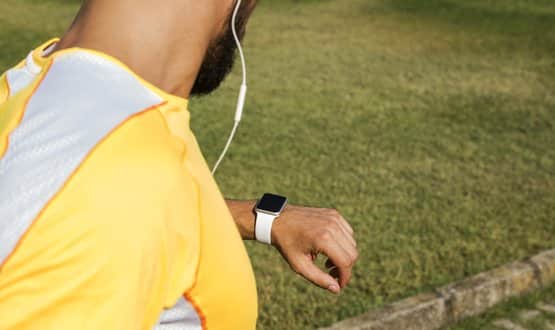Discount Apple Watch offered for health data

Health insurance customers can hand over their fitness data to land themselves an Apple Watch at a discounted price, providing they exercise strenuously for two years.
Vitality, in its Active Rewards promotion, sells the wearable for £69 with the remaining balance charged dependent on how much activity the Apple Watch measures in terms of “points”.
Nick Read, commercial director at Vitality, said the points are awarded based on “steps, heart rate and visits to partner gyms”, with the money paid back split into five different categories.
However, there is unease with the privacy implications of such deals.
Jim Killock, executive director of Open Rights Group, said the offer was “concerning”.
“It’s going to be tempting to get people to sign over their data for peak deals. That’s not a fair bargain, because people do not necessarily know the consequences or the risks they are taking with sharing their data in that kind of way.”
For the Vitality programme, in order to achieve 160+ points each month, and avoid a £12.50 monthly fee, your fitness regime could include a hefty 250,000 steps (12,500 a day) or half hour exercise at 70% maximum heart rate split, both split evenly across 20 days.
NHS Choices estimates the average person walks 3000 to 4000 steps a day.
However, if you only achieve less than 40 points a month, the bill for £369 Apple Watch come due in 24 monthly instalments.
This arrangement would also allow your health insurer knowing precisely how much you exercise, potentially affecting your insurance premium.
Active Rewards is a development in Vitality’s “shared value insurance model”, which was described in a statement as incentivising “members to make healthy lifestyle choices for the benefit of their own long-term health, and society as a whole”.
Read said in 2017 Vitality “wellness engagement is a key determinant of your insurance premium”.
“This structure explicitly recognises that members who look after their health should pay reduced insurance premiums in the long term.”
This would then be mirrored in the life insurance arm of the company, “where premiums are reduced based on engagement in the Vitality Wellness programme”.
Killock said people signing up to these kinds of discounts should be “really wary of these sorts of bargains”.
The General Data Protection Regulation, which is expected to come into effect May 2018, should influence these promotions, said Killock. “If you fall out with this provider, you need to be able to say to them, delete my information.”
“If this is enforced these bargains, these contracts, are a little bit fairer and you have the possibility of escaping on the privacy side.”
The scheme has been available in the UK since mid-October and is run in the United States and South Africa.
Vitality’s South African parent company is Discovery, which in September 2015 announced a global collaboration with Apple to launch the promotion.
The insurance company said 30,000 people were using Apple Watch globally through Discovery, but did not confirm how many people were paying back £0 a month.
Jeff Williams, Apple’s chief operating officer, said in a statement that its watch “is the ultimate companion for a healthy life”.
However, the usefulness of wearables was called into question by a recent long term study in the US. The University of Pittsburgh research, published in September, found that fitness devices may not offer an advantage over traditional diet and exercise plans for losing weight.
Despite concerns, the health care app market is still booming. One analysis, by CCS Insight, expected 1.7 million fitness trackers to be sold this year in the UK, with sales expected to continue to grow.
Apple is also rumoured to be releasing another watch in September next year. So, if you being really into fitness gadgets it may be worth holding off before signing a two-year insurance contract.
READ MORE:
* Standard wight loss methods better than wearables – study
* Digital patient services offer 'bright hope' – Nuffield
* Gareth Baxendale: can wearables count for medicine?





